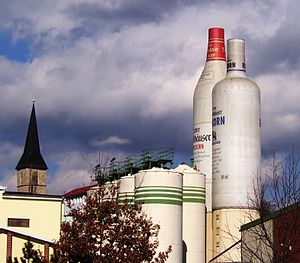- Korn (spirit)
-
For other uses, see Korn (disambiguation).A Korn distillery in Nordhausen.

Korn is a German colorless spirit (U.S.: liquor) that is usually made from fermented rye but may also be made from corn, barley, or wheat.[1] Korn differs from vodka in that it is less rigorously filtered, which leaves more of the cereal taste in the finished spirit.
Korn is the cheapest kind of spirit available in Germany, which has given it a somewhat dubious reputation. Nonetheless, it is very popular, especially in northern Germany.
Traditional Korn contains about 32% ABV (64 proof), Kornbrand no less than 37.5% ABV (75 proof). The popular Doppelkorn (double Korn) has at least 38% ABV (76 proof). A weaker variety of Korn that has less than 30% ABV can be a mixture of fruit flavors and Korn. The term Klarer (“clear one”) refers to the fact that Korn is a clear liquid. Klarer is a generic term and can apply to Korn or Doppelkorn.
Korn is usually drunk neat. In some places, a beer is often ordered together with a Kurzen (“short one”), i.e., with a shot of Korn. This combination is called a “Herrengedeck” (“gentlemen’s cover”) in most of Germany.
Some popular brands of Korn in Germany are Berentzen, Doornkaat, Fürst Bismarck, Mackenstedter, Nordhäuser, Oldesloer, and Strothmann.
History
Korn (or Branntwein) was first mentioned in the early 16th century, when its distillation became a competition among local producers in the Imperial City of Nordhausen. Nordhausen decreed the first purity law for Korn, and it is still produced there.
In 1799 Otto von Bismarck's father, Karl Wilhelm Ferdinand, established a distillery at Schönhausen.
See also
- Mackenstedter
References
- ^ Lichine, Alexis. Alexis Lichine’s New Encyclopedia of Wines & Spirits (5th edition) (New York: Alfred A. Knopf, 1987), 292.
Categories:- German cuisine
- Distilled beverages
- German distilled beverages
Wikimedia Foundation. 2010.

